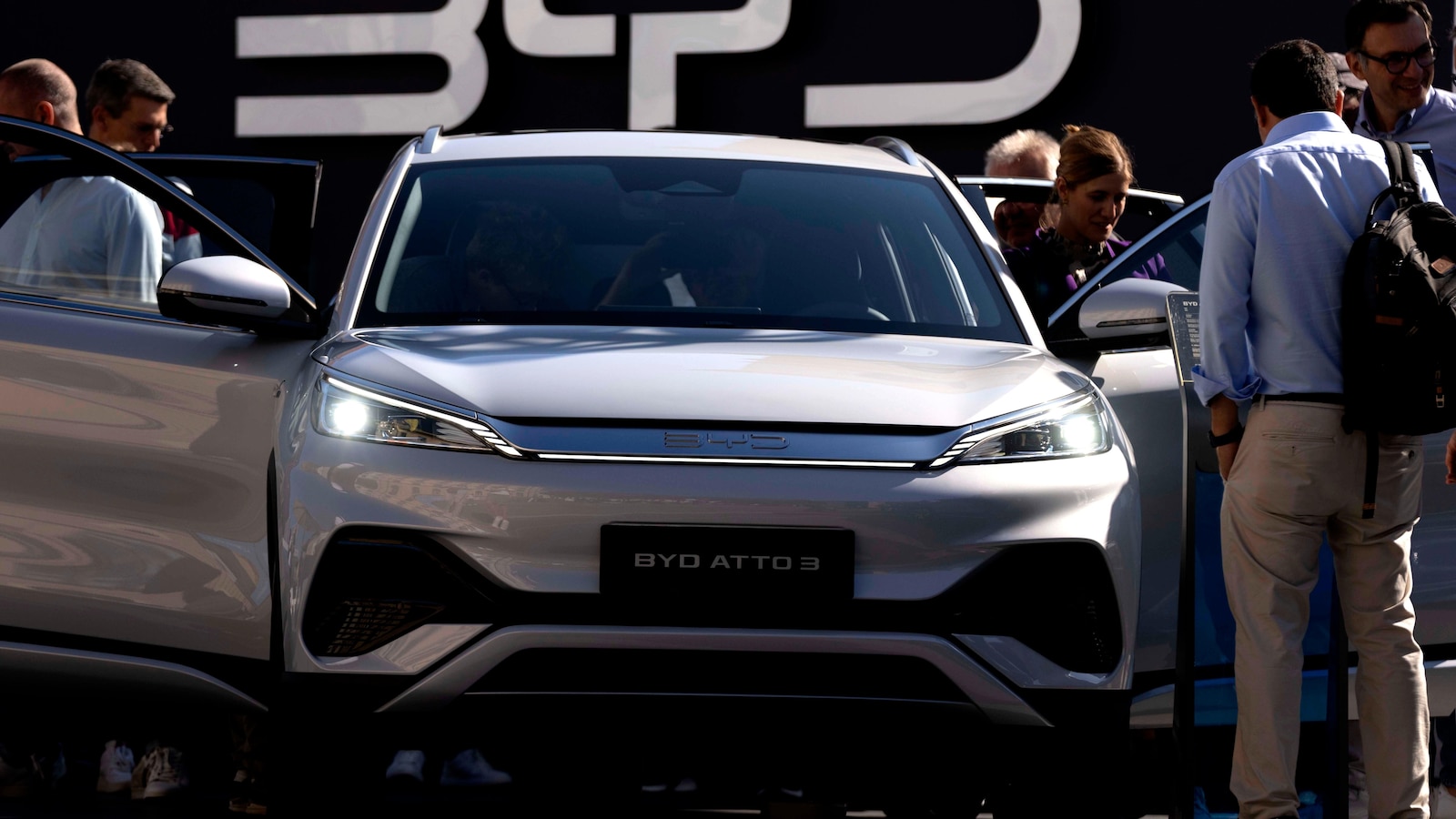
BRUSSELS — European Union countries on Friday voted to impose duties on imports of electric vehicles from China, as talks continued between Brussels and Beijing to find an amicable solution to their trade dispute before an end-of-October deadline.
Electric vehicles have become a major flash point in a broader trade dispute over the influence of Chinese government subsidies on European markets — which has forced the undercutting of EU industry prices — and Beijing’s burgeoning exports of green technology to the bloc.
The European Commission, which manages trade on behalf of the 27 member countries, welcomed their majority approval of its plan to impose the duties, even though EU automotive powerhouse Germany and Hungary voted against it.
Those duties will come into force on Oct. 31 unless China has a solution to end the standoff.
Commission spokesman Olof Gill said that any solution proposed by Beijing would have to be fully compatible with World Trade Organization rules, remedy “the injurious subsidization” by China, and be “monitorable and enforceable.”
Beijing opposes the duties. “China firmly opposes the EU’s unfair, non-compliant and unreasonable protectionist practices in this case, and firmly opposes the EU’s imposition of anti-subsidy duties on Chinese electric vehicles,” a spokesperson at China’s Commerce Ministry said in comments posted online.
Still, it means that the EU and the Chinese government have four more weeks to negotiate. Talks have already been held between Valdis Dombrovskis, the EU commissioner for the economy, and Chinese Trade Minister Wang Wentao, as well as at the level of technical experts.
The China-EU technical teams are due to resume negotiations on Oct. 7.
The duties on Chinese manufacturers, if applied, would be 17% on cars from BYD, 18.8% on those from Geely and 35.3% for vehicles exported by China’s state-owned SAIC. Geely has brands including Polestar and Sweden’s Volvo, while SAIC owns Britain’s MG, one of Europe’s bestselling EV brands.
Other EV manufacturers in China including Western companies such as Volkswagen and BMW would be subject to duties of 20.7%. The commission has an “individually calculated” rate for Tesla of 7.8%.
The retaliatory duties have run into opposition in Germany, which has Europe’s biggest economy and is home to major automakers.
Germany’s auto industry association, the VDA, said the German government sent the “right signal” by voting against them. Hildegard Müller, who chairs the group, called the decision “a further step away from global cooperation.”
She acknowledged that there is a need for negotiations with China and said that they “must prevent an escalation – ideally avert the tariffs, so that we don’t risk a trade conflict.”
Hungarian Prime Minister Viktor Orbán warned that the EU risks starting an “economic cold war” with China, and he pledged to vote against the duties. “This is the worst thing that can happen to Europe. … If this continues, the European economy will die,” he told state radio.
According to the commission, Chinese-built electric cars jumped from 3.9% of the EV market in 2020 to 25% by September 2023, in part by unfairly undercutting EU industry prices.
Brussels says companies in China accomplished that with the help of subsidies across the production chain. They ran from cheap land for factories from local governments to below-market supplies of lithium and batteries from state-owned enterprises to tax breaks and easy financing from state-controlled banks.
The rapid growth in market share has sparked fears that Chinese cars will eventually threaten the EU’s ability to produce its own green technology to combat climate change, as well as the jobs of 2.5 million auto industry workers and 10.3 million more people whose jobs depend indirectly on EV production.
___
Geir Moulson in Berlin contributed to this report.
The European Union countries have voted to impose duties on Chinese electric vehicles before the October deadline, in a move that could have significant implications for the global electric vehicle market. The decision comes as the EU seeks to protect its own electric vehicle industry and ensure fair competition in the market.
The EU has been considering imposing duties on Chinese electric vehicles for some time now, as concerns have been raised about the impact of Chinese subsidies on the global electric vehicle market. Chinese companies have been able to produce electric vehicles at a much lower cost than their European counterparts, leading to fears that they could undercut European manufacturers and dominate the market.
In response to these concerns, the EU has decided to impose duties on Chinese electric vehicles before the October deadline. This move is expected to level the playing field for European manufacturers and ensure fair competition in the market. It is also seen as a way to protect European jobs and promote the growth of the electric vehicle industry in the EU.
The decision to impose duties on Chinese electric vehicles has been met with mixed reactions. While some European manufacturers have welcomed the move, others have expressed concerns about the potential impact on their businesses. Chinese manufacturers, on the other hand, have criticized the decision, arguing that it is unfair and could harm their competitiveness in the global market.
Despite these concerns, the EU countries have decided to move forward with imposing duties on Chinese electric vehicles. This decision is seen as a necessary step to protect European manufacturers and ensure fair competition in the market. It is also a sign of the EU’s commitment to promoting sustainable transportation and reducing carbon emissions.
In conclusion, the EU countries’ decision to impose duties on Chinese electric vehicles before the October deadline is a significant development in the global electric vehicle market. While there are concerns about the potential impact of these duties, they are seen as a necessary step to protect European manufacturers and ensure fair competition in the market. It remains to be seen how this decision will affect the global electric vehicle industry, but one thing is clear: the EU is taking action to promote sustainable transportation and reduce carbon emissions.


